 |
| Leonor Varela with Anne-Katrin Titze on The Cow Who Sang A Song Into The Future: “For me the stories that came to mind to build my character had to do with familiar echoes in the disconnect …” |
Francisca Alegría’s The Cow Who Sang A Song Into The Future (La Vaca Que Cantó Una Canción Hacia El Futuro), co-written with Fernanda Urrejola, Manuela Infante and shot by Inti Briones, stars Leonor Varela with Mia Maestro, Alfredo Castro, Marcial Tagle, Enzo Ferrada Rosati, Laura Del Rio Rios, María Velasquez, and 2222, the cow.
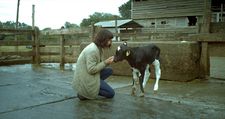 |
| Leonor Varela as Cecilia with a calf: “it’s so sad, they’re separated from their mother very early on, but their instinct is to suck.” Photo: Inti Briones |
In recent years, a number of outstanding films brought to the forefront an issue society at large is all too willing to ignore, namely the treatment of farm animals and the direct link to the meals people eat each day which remains preferably obscured. There was in 2020 Viktor Kosakovskiy’s brilliant Gunda, whose protagonist, the mother pig of the title, provided an understanding of empathy and loss that most movies cannot even dream of.
Nominated this year for an Oscar, Ireland’s The Quiet Girl, directed by Colm Bairéad, features a young protagonist who asks why it is that we humans drink the milk of cows, originally intended to feed the calves. This question arises here again, asked by Cecilia’s (Leonor Varela) youngest child Alma (Laura Del Rio Rios) in this remarkable film which combines the supernatural with the environmental.
Cecilia, a surgeon and mother of two, receives a call that her father (Alfredo Castro) is in the hospital after claiming to have seen his dead wife (Magdelena played by Mia Maestro) who presumably had committed suicide when Cecilia and her brother Bernardo (Marcial Tagle) were still little. As a good daughter, Cecilia packs up her family, which includes Alma and Tomás (Enzo Ferrada Rosati), who defies expectations to live as a boy, to fly back home to the rural dairy farm where her father, brother, and the perceptive and protective nanny Felicia (María Velasquez) still reside. Magdalena - a loaded name in all its variations in cinema, at least since Hitchcock’s Vertigo - emerging from the river is a figure not unfamiliar to lore of old.
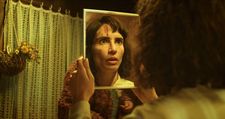 |
| Leonor Varela: “I felt I had to dig more into the personal trauma department for Cecilia.” Photo: Inti Briones |
Rip van Winkle, La Llorona in her many incarnations, Angela Carter’s Cinderella version called Ashputtle, or the Mother’s Ghost may come to mind. But the world is in flux, faster and faster and what was wisdom once upon a time needs to be combined with very recent reports of polluted rivers, dying fish, poisoned waterfowl, and disappearing bees. The herd of cows that went out at night form a chorus to sing to us their resolve that the world cannot continue this way. “We will return one day” the chant rings out. The way Cecilia’s mother returned from the deep? Or in another eternal return?
The Cow Who Sang A Song Into The Future mysteriously invites speculation on many fronts. What if nature became so out of whack that a person could come back from the dead? What if you yourself would return one day in the future with all your appetites for life intact?
Happy Chilean and US Mother’s Day, Sunday, May 14, 2023!
From Ojai, California, Leonor Varela joined me on Zoom for an in-depth conversation on The Cow Who Sang A Song Into The Future.
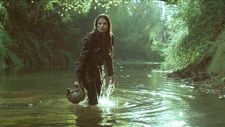 |
| Cecilia’s (Leonor Varela) mother Magdalena (Mia Maestro): “If you think about it, if someone came back from the dead, it would just be heightened.” Photo: Inti Briones |
Anne-Katrin Titze: Hi Leonor! You are in L.A.?
Leonor Varela: Hello! I live in Ojai.
AKT: First of all congratulations on a beautiful film and a great performance. I noticed in the end credits that the lovely Cow 2222 has the name Leonor. Can you tell me about that?
LV: Isn’t that funny? Francisca early on chose a cow to be the cow. There are many cows in the movie, but she would be the protagonist. And the handler who is a cow herder, cow trainer, whatever you want to call it, from the area, decided that - because they started rehearsing without me - that he would call her Leonor. So that’s how she was baptised Leonor.
And that’s the number she came with. I thought it was really interesting because in the script my character’s journey wasn’t so tied to the cow’s journey. But they ended up really becoming an intricate arc together. Maybe it was meant to be.
AKT: I think so. How did you feel during these scenes interacting with the cows? And the calves as well who were sucking on your fingers - these are touching moments.
LV: Thank you! Cows are very skittish, they’re not easy to get close to, they’re not very trusting, they’re kind of uncertain. They don’t have the presence or command of a horse. They are shyer and more scared, so it was hard to get close to them. Especially as it had to look like she was trusting me or calling me, that’s how it was written in the story. You know, I have a thing for animals. I wanted to be a vet when I was little.
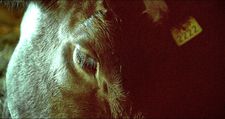 |
| Leonor Varela on 2222, aka Leonor, the cow: “She would be the protagonist.” Photo: Inti Briones |
I think animals really respond to how your presence is, what you’re coming at them with, whether it’s respectfully and kindly and with love. Just like cats or dogs or horses, they all respond to that same presence. I want to say energy but that sounds very foo-foo. Whatever kind of vibration you put out there. So I just really had to tune into the cow. My acting was reduced to tuning into a cow. And so I just really moved very slow to have her trust me. That allowed for the scene on the river - that was one full take!
AKT: Wow!
LV: There was no cutting. She allowed for all of it to happen. And with the calves, it’s so sad, they’re separated from their mother very early on, but their instinct is to suck. My fingers they would go instantly into sucking and that became a metaphor in itself, which was totally improvised.
And when I broke down in that scene, when my character has her breakdown, when Cecilia finally lets go and kind of breaks this armour that she’s been holding - it was so surprising to see them all just kind of come towards me, like “Are you okay?” Checking in on me! It was so cute; it was like, oh my god, these animals, they’re so sensitive!
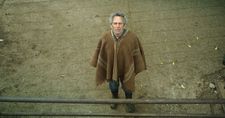 |
| Cecilia’s father Enrique (Alfredo Castro): “She’s a complete daddy’s girl.” Photo: Inti Briones |
AKT: It’s an understanding that we see rarely captured on film. Pets do it! My dog, my cat, even my bird - all of them reacted like that in moments of distress. I also became a New York State Department of Environmental Conservation licensed Wildlife Rehabilitator so I can totally relate to that.
LV: That’s such a wonderful side job, hobby, passion, whatever you want to call it. That’s wonderful.
AKT: All of the above, you got it. You spoke of metaphor. On the one hand, it is of course the reality of calves being separated from their mothers. People don’t want to know that we are dealing here also with families. I felt that was one of the central metaphors. Was this one of the points that interested you in making the film?
LV: I love that you’re seeing that and I think it’s very central to the theme of the movie. I don’t want to limit your interpretation - I think it’s wonderful that that’s what’s coming through for you. I think yes, the central theme is motherhood and therefore family. That’s a beautiful way to frame it. There are so many other things that resonated with me on so many levels, I don’t think I was aware of that one.
AKT: Tell me what resonated with you especially!
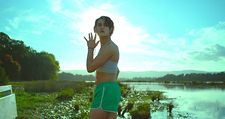 |
| Tomás (Enzo Ferrada Rosati) Cecilia’s (Leonor Varela) teenager: “Cecilia just refuses to see her as who she is.” Photo: Inti Briones |
LV: It was a very visceral reaction. I think I’ve had that on the movies that have been more transformative for me on a personal level. I just had such a strong sense of déjà-vu with the script, that I read this before. I was so oddly familiar, that I had the Zoom because Francisca wanted to meet me to invite me to participate in the Sundance Directors Lab to work with her on the script in that setting.
When I talked to her on Zoom I said “We know each other, right? You’ve sent this to me before?” And she was like “No!” And I was like “Come on, where have I read this before?” I was so certain. It was not a rational thought, bullet-point thing I can point towards. It was a deeply magical realism feeling of déjà-vu. Very apropos to the material, I have to say.
AKT: There are many echoes you can see from ancient stories, folklore. There’s the Rip Van Winkle story, tales of someone returning from the dead. There are the different versions in Latin countries of La Llorona, the weeping woman - this is not her story, but they share the connection to water. Were there stories that came to mind that maybe you grew up with?
LV: Not in that sense. I don’t think the folklore was present when we were working on these characters. For me the stories that came to mind to build my character had to do with familiar echoes in the disconnect from my personal family, echoes from other abandonment issues. Like what it means to be left. What Cecilia felt when her mother chose death over staying with her.
 |
| Ed Bahlman's jacket closely resembles the one worn by Leonor Varela as seen in the calf photo |
Those are the stories that nurtured my imagination so that I could understand what it meant to be so shut down, so afraid of life, of love, of accepting what is. That she had to control everything, that she became the top surgeon because control was the only way to feel like everything wasn’t just going to blow up in her face. I felt I had to dig more into the personal trauma department for Cecilia. She is somebody that lives with a gigantic amount of fear that she had to build all these walls to survive the world.
AKT: Cecilia’s interactions with the individual characters are all so different. The father, for instance, has moments when he is asking for forgiveness. Your character is with us, the audience, because we also want to know what he needs to be forgiven for. Then the whole gaslighting comes in.
LV: Cecilia adores her father, that’s all she’s had, that’s all she’s known, that’s where she drew her ability to survive in the world. A very patriarchal understanding of the world - discipline, commitment, order, strength, pushing forward, getting through, power. She’s a complete daddy’s girl.
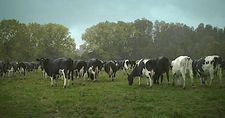 |
| Leonor Varela on 2222 with the herd: “Cows are very skittish, they’re not easy to get close to …” |
And she’s run away as far as she can from this world, but when she is forced to be back in there, little by little this figure will sort of start to come apart, this building up of this character. There’s a couple of scenes that were cut that were so interesting between me and my father where we had a very strong confrontation. I miss them; I wish they had served the story better to remain there.
They kind of broke down all that unravelling and the realization of who he really is and what he’s really done and the awakening, not un-similar to the awakening we women have had in this past decade in terms of our role in society and how we’re treated and our bodily rights, starting with the #MeToo movement.
AKT: Then on the other hand there is the relationship to Tomás [Enzo Ferrada], which also has a great arc.
LV: Yeah, Cecilia just refuses to see her as who she is. In Chilean society, the Catholic Church and the societal normative is very strong. You belong and you look a certain way. Not unlike New Jersey and New York. The same way in Chile, you do not do certain things. I think that adds to the pressure of her demand of her son, the way she sees him, to remain a certain way, as opposed to accepting her for who she is.
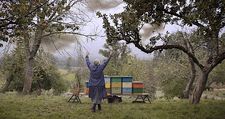 |
| Felicia (María Velasquez) with her escaped bees |
Tomás very much reminds me of my mother’s free spirit, so that’s even more triggering for her where she cannot take it. Some lines were added in post to make that stronger, it wasn’t quite as strong in the shooting of the movie. That was a decision the director later made. A lot of this film was made in post-production, really. A lot of things were very much tweaked. The arc remains even wider now.
AKT: A scene I found particularly striking is the first confrontation with the dead mother. I couldn’t help but think in reality the horror of having the dead mother return. And your performance at that moment oscillates, it is so emotionally torn. From “You go away now!” to wanting her there. It’s a great scene.
LV: I hate you, I love you! I want you, I don’t want you, I refuse you but I really need you. It’s like my eight-year-old daughter: “You’re the worst in the world! And Mommy I need you!” Isn’t that the way we are as human beings? The complexity of the things that we feel.
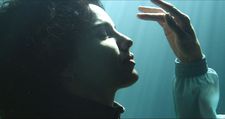 |
| Leonor Varela on Cecilia: “I think the intention was to introduce her as this person living in a very controlled world.” Photo: Inti Briones |
And this is just a heightened situation. If you think about it, if someone came back from the dead, it would just be heightened. It’s like with my eight-year-old daughter this morning; “I hate you, I hate you, you’re the worst. But I want you, I need you, you’re my mother.“ There’s nothing that brings more comfort, love, solace, peace, security than a mother.
AKT: That’s why in fairy tales there often is the good mother and the bad mother. The good mother is dead and there is an evil stepmother so that children can have both feelings simultaneously and project them on one character or another. Which reminds me - there is a fascinating tale by Angela Carter, called Ashputtle, or the Mother’s Ghost, which is a Cinderella version. In the story the mother’s ghost returns and goes into a cow, goes into a cat, then into a bird to help out her child.
LV: Wow!
AKT: The first encounter you have in the film is with a spider! A shower and a spider is an interesting way to introduce a character.
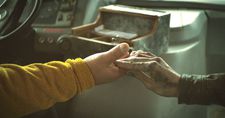 |
| Leonor Varela: “Cecilia finally lets go and kind of breaks this armour that she’s been holding …” Photo: Inti Briones |
LV: I think the intention was to introduce her as this person living in a very controlled world. And this little creature comes in the most vulnerable place, naked in the shower. And she is not having it. She goes and grabs the worst chemicals to just kill it. It speaks to where she’s at when we meet her, this place of refusal of letting that wilderness, that life, that unplanned, unpredictable thing inside. She’s not having it.
AKT: I love your bells that chime in the background as we speak!
LV: Oh, the chimes, yeah.
AKT: A word about the costumes and the nuances. Once your character arrives at the dairy farm, you start to wear a brown cardigan that was probably there before, or that you maybe borrowed from Felicia or your father. And you wear one jacket that looks very much like this [I hold up Ed Bahlman’s Uniqlo jacket]
LV: Ha, good one!
AKT: Were the costumes helpful for you to capture Cecilia?
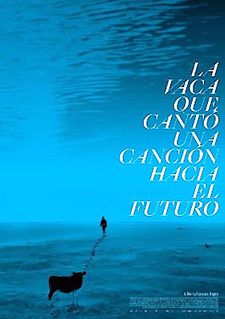 |
| La Vaca Que Cantó Una Canción Hacia El Futuro poster |
LV: Yeah, we wanted to illustrate with the wardrobe the enormous arc Cecilia goes through. Meeting her in this more formal setting, buttoned up. Francisca wanted me just slightly off, my bangs are slightly too short and my pants are slightly too big. She’s not somebody that’s like a wow factor, she’s just not comfortable in her body 100%. We wanted that awkwardness combined with a formality and the buttoned-up and the button-down, like repressed feeling.
Then as she lets nature start, in this encounter going back home, to affect her, she grabs other clothes. This is my home, so I probably have old sweaters there and stuff that I start to put on. And little by little, my bangs and all that just breaks down and is infused and filtered by the environment, the natural world. The woods, the cows, all of it, the mud, the grit, the humidity. It was definitely helpful. I only have a couple of wardrobe changes but the changes were good. We also needed the wardrobe to work for all the underwater stuff.
AKT: That’s a good way to phrase it. “We will return one day” is the chorus. Thank you so much for this!
LV: Thank you so much, Anne-Katrin, really nice to meet you. I’m glad that the film resonated with you in that way!
The Cow Who Sang A Song Into The Future opens at the Quad Cinema in New York on Friday, May 19.





















